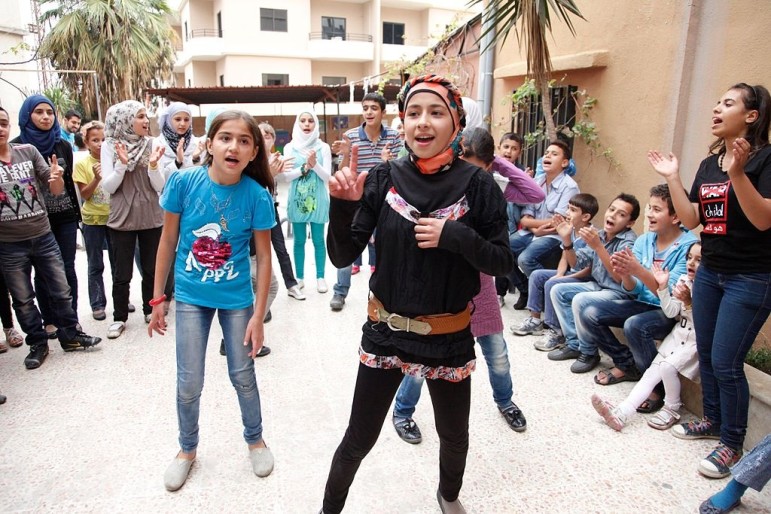
November 26, 2015; The Atlantic
Tennessee state lawmaker Glen Casada made headlines after the attacks in Paris when he called for “gathering up” Syrian refugees who have settled in the state and “politely” taking them back to Immigration and Customs Enforcement with the message, “They’re not coming to Tennessee, they’re yours.” In response to reporters’ questions about whether he had gone too far, Casada denied that he was speaking about internment camps. “No,” he said. “We gather them, we take them back to ICE…and we say, ‘Gentlemen, make sure these guys have no tie to terrorist activities.’”
Tennessee is one of the more than half of U.S. states whose governors have formally opposed accepting refugees from Syria. Covering the governors’ campaign as it began to unfold, Rick Cohen saw the states’ actions and those at the federal level as a political tool aimed at not just Syrian refugees, but the nation’s entire resettlement apparatus, which could bring in 85,000 asylum seekers next year, of whom perhaps 10,000 might be Syrians.
Meanwhile, as Ruth McCambridge reports, over in Texas, the Health and Human Services Commission asked nonprofits involved with resettlement to stop serving refugees from Syria. While Catholic Charities of Dallas initially agreed that it would comply, everyday Catholics taking to social media and other outlets brought about a swift reversal in the agency’s position.
Both McCambridge and Cohen challenge the nonprofit community to have a strategy for standing up to those using fear and hatred as political tools. Yesterday, McCambridge pointed to groups in New Jersey and Indiana that are pushing back. While those in the resettlement community have come out with strongly worded responses, we are reminded that any organization whose mission promotes inclusion, openness and democracy has a stake in this.
As has been reported in news articles and stories since the Paris attacks, anti-Muslim and anti-refugee rhetoric and actions have brought to sharp relief America’s fear of and objectification of the other. As Emma Green writes:
Muslims—whether they’ve been in the U.S. for generations or for just a few years; whether they’re white or South Asian or of Arab descent; whether they’re practicing or lapsed or somewhere in between—are often considered as a mass, and mostly in relation to terrorism.
Some are preparing for the prospects of legal battles. As Lavinia Limón, head of the U.S. Committee for Refugees and Immigrants, puts it, “This is America and we’re very concerned about protecting these refugees from the ugliness that we hear every day on the television.”
And ugly it is. Ben Carson’s referring to refugees as “rabid dogs” is not only the most visible example, it is unfortunately illustrative of the tropes that have taken over much of the conversation on Facebook and Twitter, at the dinner table, on talk radio and among cable news pundits. “Politicians won’t solve this problem”; “All those refugees look like able-bodied young men to me”; “No one is even looking at their paperwork”; “They come in and have babies and then they stay here forever”; “Who pays for all of the free services?”
Sign up for our free newsletters
Subscribe to NPQ's newsletters to have our top stories delivered directly to your inbox.
By signing up, you agree to our privacy policy and terms of use, and to receive messages from NPQ and our partners.
Molly Ball attended a Trump rally South Carolina and, as she writes in The Atlantic, those expressing these viewpoints aren’t “skinheads. They don’t seem like jerks.” Describing the mood of the rally, she says, “the energy in this room does not feel dark and aggressive and threatening. It doesn’t feel like a powder keg about to blow, a lynch mob about to rampage. It feels joyous,” despite the negativity and fear. And as Ball candidly observes, the reporters like being there. They know the more outrageous his comments, the more likely they’ll get airtime.
But practiced on the ground, the motivation is anything but lightness and love, as a scene in front of the Idaho state Capitol recently revealed when groups opposing refugees carried hateful signs and squared off against those who had come to support the plans for Syrian refugee resettlement. Muslim leaders have reported threats, vandalism, and other crimes targeting mosques in Kentucky, Ohio, New York, Nebraska, Florida, Texas, Virginia, Tennessee, and other states. And then of course there is the campaign from the 31 state governors, led by Michigan’s Rick Snyder, whose state has been known for decades for being home to one of the largest Arab-American communities outside the Middle East.
In New York City, Muslims have been reporting individual threats and intimidation, a phenomenon the Council on American-Islamic Relations calls “the mainstreaming of Islamophobia.” As Ferida Osman, a Muslim born and raised in the U.S. and a senior at Hunter College, told the Times’ Kirk Semple after she was spit on by a stranger in Penn Station last week, “I didn’t feel like a person anymore.”
She added, “You feel like you are alone. It’s a horrible feeling of isolation.”
The U.S. Holocaust Museum issued a notable statement last month calling on public figures and citizens to avoid condemning today’s refugees as a group, invoking the memories of Jews trying to escape Nazi Germany. The International Rescue Committee debunks four myths that drive the misguided efforts of elected officials calling for a halt to resettlements. Sparing no words, the IRC is blunt: “We deplore the insinuation in the recent banning orders against Syrian refugees that either they are terrorists, or that it is impossible to separate them from those seeking to come here to commit terrorism.”
Church World Service is also clear that “fearmongering has no place in society,” and calls on people of all faiths to stand in solidarity with refugee and migrant communities. World Relief, an evangelical organization, says that actions by Republican presidential nominees “do not reflect what we’ve been hearing from our constituencies.” And the U.S. Conference of Catholic Bishops has issued the following statement:
Instead of using this tragedy to scapegoat all refugees, I call upon our public officials to work together to end the Syrian conflict peacefully so the close to 4 million Syrian refugees can return to their country and rebuild their homes. Until that goal is achieved, we must work with the world community to provide safe haven to vulnerable and deserving refugees who are simply attempting to survive. As a great nation, the United States must show leadership during this crisis and bring nations together to protect those in danger and bring an end to the conflicts in the Middle East.
As for the refugees themselves, as Lavinia Limón puts it: “I hope they don’t learn English too quickly; they’ll have to understand what certain people are saying.”
There is a scene in the beginning of the movie Hotel Rwanda in which Georges Rutaganda, one of the then-leaders of the Rwandan Hutu militia, is heard on RTLM radio inciting his countrymen to wipe out the rebel “cockroaches,” calling them “murderers” and “invaders.” While clearly a dramatic device, it reveals the way in which the deliberate and calculated objectification of human beings insinuates itself into the national conversation and then, over time, ceases to shock. As the discourse around immigrants and refugees devolves increasingly into incendiary rhetoric, it’s more important than ever that those serving the most marginalized continue protecting those they serve, pushing back against the demagoguery, and laying the facts out front and center.—Patricia Schaefer












